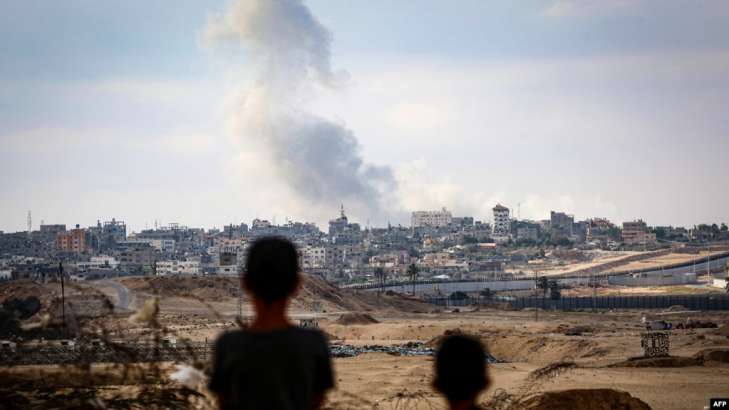
Photo: Israeli strikes against east of Rafah in the southern Gaza Strip, May 13/AFP
US Secretary of State Antony Blinken outlined the US position regarding the ground military operation in Rafah during a telephone conversation with Israeli Defense Minister Yoav Gallant
Fightings raged between Israeli troops and Hamas militants in northern and southern Gaza on Monday.
Eyewitnesses reported fighting in the Jabaliya refugee camp in northern Gaza, an area where Israeli troops have returned to connection with an attempt to regroup militants, which, according to the military, is being undertaken by Hamas.
Residents also reported increased air and ground attacks in Rafah, near the border between Gaza and Egypt, Voice of America reported.
The US State Department said late Sunday that Secretary of State Antony Blinken had discussed “objections” US against major ground military operation in Rafah” during a telephone conversation with Israeli Defense Minister Yoav Gallant.
The statement said Blinken also reaffirmed the US commitment to a "common purpose– destroy Hamas,” while emphasizing the need to protect civilians and calling on Gallant to “help solve the problems of proliferation (of humanitarian aid) in Gaza while Israel pursues Hamas.”
UN human rights chief Volker Türk said on Sunday that ongoing fighting and evacuation orders have led to “massive displacement of an already deeply traumatized population,” adding that there is “no place safe” in Gaza.
"I have repeatedly expressed my alarm about the catastrophic consequences of a possible full-scale offensive on Rafah, including the possibility of new atrocities, – Turk said. – I see no way in which the latest evacuation orders, much less a full-scale offensive in an area with an extremely dense civilian presence, could be reconciled with the mandatory requirements of international humanitarian law and with the two sets of mandatory provisional measures ordered by the International Court of Justice.” /p>
Earlier on Sunday, Blinken told NBC that Israel has no concrete plan to protect the Palestinians or provide them with sufficient humanitarian assistance.
"There is something else important, – Blinken said. – We also have not seen a plan for what will happen the day after the end of the war in Gaza. Because the trajectory that Israel is now on is that even if it goes in and takes tough action in Rafah, there will still be thousands of armed Hamas there.”
The foreign minister said that “we have seen how in areas that Israel has cleared in the north, even in Khan Yunis, Hamas is returning.”
“So the trajectory now is that (Israel) going into Rafah, even to deal with those remaining (four) battalions, especially in the absence of a plan for civilians, risks causing terrible harm to civilians and not solving the problem we all We want to decide, namely, to make sure that Hamas cannot rule Gaza again,” – Blinken said.
The United States, Israel's main arms supplier, has repeatedly warned Israel against a full-scale ground offensive on Rafah, but the IDF has continued aerial bombardment and more limited ground offensives.
President Joe Biden has suspended the shipment of 3,500 bombs to Israel over concerns they could be used in an attack on Rafah. In addition, Biden said last week that he would stop sending Israel some other offensive weapons if a full-scale offensive on Rafah begins.
Israeli talks with Hamas on a ceasefire and the release of about 100 hostages that Hamas still holds hold, have reached a stalemate, and Israeli Prime Minister Benjamin Netanyahu has repeatedly said his country will not end the war until it destroys the remaining Hamas militants in Rafah.
Blinken warned of continued chaos.
< p>"Potentially, Israel could inherit an insurgency that leaves behind many armed Hamas fighters, or, if it leaves a vacuum filled with chaos, anarchy and possibly replenishment of Hamas, – he said. – We talked to them about a much more effective way to achieve long-term results, long-term security both in Gaza itself and in the region as a whole.”
” The fastest way to put an end to this – release the hostages. We will get a ceasefire that we can develop and build into something longer and more durable. The various teams continue to negotiate – he said. – It will also be the best way to make sure that we can actually increase humanitarian assistance and better protect civilians in Gaza.”
” Hamas says it is interested in this. But his actions certainly indicate the opposite,” – added Blinken.
Prepared by: Sergei Daga

